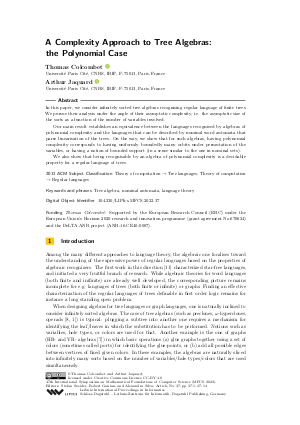A Complexity Approach to Tree Algebras: the Polynomial Case
Authors
Thomas Colcombet  ,
Arthur Jaquard
,
Arthur Jaquard 
-
Part of:
Volume:
47th International Symposium on Mathematical Foundations of Computer Science (MFCS 2022)
Part of: Series: Leibniz International Proceedings in Informatics (LIPIcs)
Part of: Conference: Mathematical Foundations of Computer Science (MFCS) - License:
 Creative Commons Attribution 4.0 International license
Creative Commons Attribution 4.0 International license
- Publication Date: 2022-08-22
File

PDF
LIPIcs.MFCS.2022.37.pdf
- Filesize: 0.82 MB
- 14 pages
Document Identifiers
Subject Classification
ACM Subject Classification
- Theory of computation → Tree languages
- Theory of computation → Regular languages
Keywords
- Tree algebra
- nominal automata
- language theory
Metrics
- Access Statistics
-
Total Accesses (updated on a weekly basis)
0PDF Downloads0Metadata Views
Abstract
In this paper, we consider infinitely sorted tree algebras recognising regular language of finite trees. We pursue their analysis under the angle of their asymptotic complexity, i.e. the asymptotic size of the sorts as a function of the number of variables involved. Our main result establishes an equivalence between the languages recognised by algebras of polynomial complexity and the languages that can be described by nominal word automata that parse linearisation of the trees. On the way, we show that for such algebras, having polynomial complexity corresponds to having uniformly boundedly many orbits under permutation of the variables, or having a notion of bounded support (in a sense similar to the one in nominal sets). We also show that being recognisable by an algebra of polynomial complexity is a decidable property for a regular language of trees.
Cite As Get BibTex
Thomas Colcombet and Arthur Jaquard. A Complexity Approach to Tree Algebras: the Polynomial Case. In 47th International Symposium on Mathematical Foundations of Computer Science (MFCS 2022). Leibniz International Proceedings in Informatics (LIPIcs), Volume 241, pp. 37:1-37:14, Schloss Dagstuhl – Leibniz-Zentrum für Informatik (2022)
https://doi.org/10.4230/LIPIcs.MFCS.2022.37
BibTex
@InProceedings{colcombet_et_al:LIPIcs.MFCS.2022.37,
author = {Colcombet, Thomas and Jaquard, Arthur},
title = {{A Complexity Approach to Tree Algebras: the Polynomial Case}},
booktitle = {47th International Symposium on Mathematical Foundations of Computer Science (MFCS 2022)},
pages = {37:1--37:14},
series = {Leibniz International Proceedings in Informatics (LIPIcs)},
ISBN = {978-3-95977-256-3},
ISSN = {1868-8969},
year = {2022},
volume = {241},
editor = {Szeider, Stefan and Ganian, Robert and Silva, Alexandra},
publisher = {Schloss Dagstuhl -- Leibniz-Zentrum f{\"u}r Informatik},
address = {Dagstuhl, Germany},
URL = {https://drops.dagstuhl.de/entities/document/10.4230/LIPIcs.MFCS.2022.37},
URN = {urn:nbn:de:0030-drops-168357},
doi = {10.4230/LIPIcs.MFCS.2022.37},
annote = {Keywords: Tree algebra, nominal automata, language theory}
}
Author Details
Funding
- Colcombet, Thomas: Supported by the European Research Council (ERC) under the European Union’s Horizon 2020 research and innovation programme (grant agreement No.670624) and the DeLTA ANR project (ANR-16-CE40-0007).
References
- Achim Blumensath. Recognisability for algebras of infinite trees. Theoretical Computer Science, 412(29):3463-3486, 2011. URL: https://doi.org/10.1016/j.tcs.2011.02.037.
- Achim Blumensath. Regular Tree Algebras. Logical Methods in Computer Science, Volume 16, Issue 1, February 2020. URL: https://doi.org/10.23638/LMCS-16(1:16)2020.
- Mikołaj Bojanczyk. Slightly infinite sets, 2016. A draft of a book available at URL: https://www.mimuw.edu.pl/~bojan/paper/atom-book.
- Mikolaj Bojanczyk and Michal Pilipczuk. Definability equals recognizability for graphs of bounded treewidth. In Martin Grohe, Eric Koskinen, and Natarajan Shankar, editors, Proceedings of the 31st Annual ACM/IEEE Symposium on Logic in Computer Science, LICS'16, New York, NY, USA, July 5-8, 2016, pages 407-416. ACM, 2016. URL: https://doi.org/10.1145/2933575.2934508.
-
Thomas Colcombet and Arthur Jaquard. A complexity approach to tree algebras: the bounded case. In 48th International Colloquium on Automata, Languages, and Programming (ICALP 2021). Schloss Dagstuhl-Leibniz-Zentrum für Informatik, 2021.

- Thomas Colcombet and Christof Löding. Regular cost functions over finite trees. In Proceedings of the 25th Annual IEEE Symposium on Logic in Computer Science, LICS 2010, 11-14 July 2010, Edinburgh, United Kingdom, pages 70-79. IEEE Computer Society, 2010. URL: https://doi.org/10.1109/LICS.2010.36.
-
Bruno Courcelle and Joost Engelfriet. Graph structure and monadic second-order logic: a language-theoretic approach, volume 138. Cambridge University Press, 2012.

- Zoltán Ésik and Pascal Weil. Algebraic recognizability of regular tree languages. Theor. Comput. Sci., 340(1):291-321, 2005. URL: https://doi.org/10.1016/j.tcs.2005.03.038.
- Zoltán Ésik and Pascal Weil. Algebraic characterization of logically defined tree languages. Int. J. Algebra Comput., 20(2):195-239, 2010. URL: https://doi.org/10.1142/S0218196710005595.
-
Sławomir Lasota, Bartek Klin, and Mikołaj Bojańczyk. Automata theory in nominal sets. Logical Methods in Computer Science, 10, 2014.

-
Marcel-Paul Schützenberger. On finite monoids having only trivial subgroups. Information and Control, 8:190-194, 1965.

